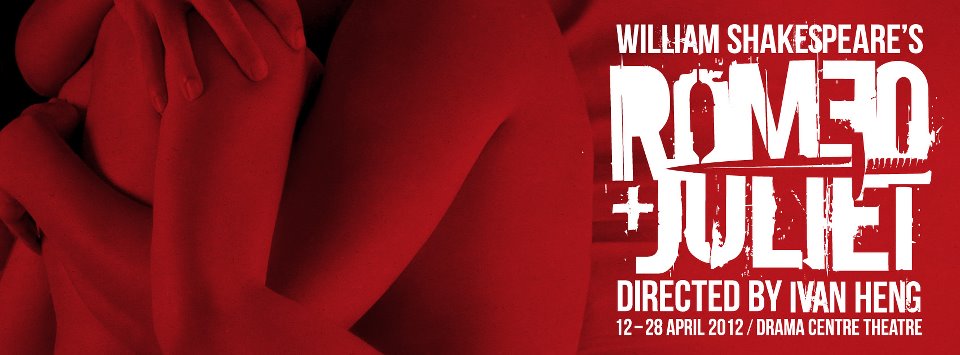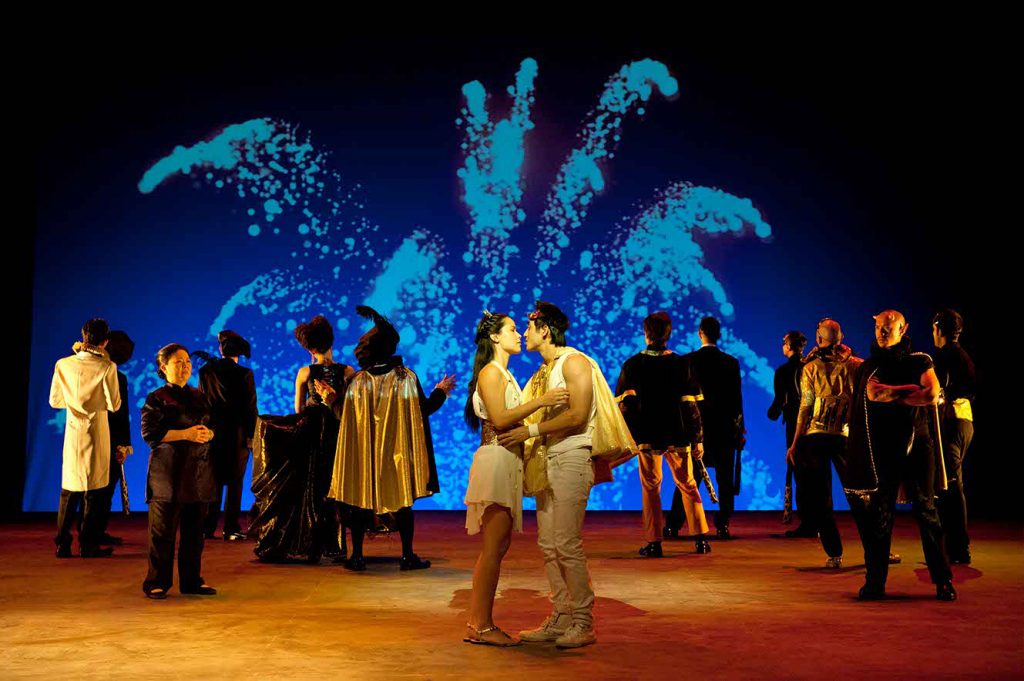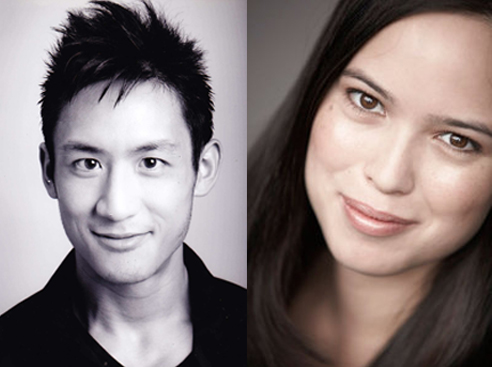Act One, Scene One: The Play
“Did my heart love till now? Forswear it, sight! For I ne’er saw true beauty till this night.” – Romeo
From gun-toting businessmen in Leonardo DiCaprio’s Romeo + Juliet, to the Singlish-spouting heirs of rival chicken rice stall owners in Chicken Rice War, Shakespeare’s immortal tale has been updated to stay relevant to current day audiences.
Singaporean theatre company W!ld Rice, fresh from staging Cooling Off Day, takes a new stab at contemporising the world’s best known star-crossed teen lovers and pulls it off with flair, bringing you Romeo and Juliet setin the 21st century through the spectacular performances from the cast, blending the archaic Shakespearean text with modern society, giving us a fresh and enjoyable perspective of the play.
You’d expect no less a skilful rendering of such classic material from director Ivan Heng, who himself won 2 awards in Scotland for his titular role as Richard III, a complex character by the Bard, in the early 1990s. His company will be staging a new play at the start of every year under their brand new W!ld World Classics series, with Romeo and Juliet being the first.
The audience at the Drama Centre on Apr 14 got Heng’s vision of an “essentialist” approach to theatre. The bare stage, leaving only Juliet’s bed, which doubles as a balcony as well, far from suggesting lack of funding put the action and dialogue right in the centre, where they should be, with the unusual inclined stage thrusting the cast and the action into the audience, creating a similar setting to the one Shakespeare wrote for – one where performances were right in the midst of people. Backdrops are changed according to the different scenes, with fireworks erupting during the party scene, and a blood red moon during the scene where Romeo attempts to break into Juliet’s crypt, leaving us with a sense of foreboding of the scene to come.
Though the scenery may be simple, by no means do the props and costumes share the same sentiment, and this is where the contemporary approach really shines. Characters can be dressed up in full Elizabethan-era garb during the party scene, with popular pop sensation Lady Gaga’s Marry the Night being played over the speakers. Rather than seeming out of place, the contemporary music complimented the scene perfectly. Yet another instance of how the play manages to display contemporary society is when our hero Romeo abandons his party garb and slips into a pair of jeans and a hoodie to meet Juliet.
And indeed, most other characters can also be found in outfits from modern society, with Tybalt sporting a black leather trench coat and Balthasar with a motocycle helmet. Arrays of modern and contemporary items are also used, such as golfing clubs, batons, and even flick knives, compared with the standard swords we’ve come to expect from Shakespearean fight scenes.
While the props, costumes and indeed the trailer devoid of spoken words may reflect contemporary society, Director Heng and the cast stay true to the spirit of the original work, blending the beauty and poetry of the more than 400-year-old English with the natural, rather than pretentious put-on accents of the local actors. The result is an interesting blend of old and new together in a play, polished by the actors to perfection.
Hansen Tan (Romeo) and Julie Wee (Juliet) pull off a dazzling performance, living out their character’s emotions and nuances on stage with accuracy. Although looking slightly older than their character’s ages (17 and 13 respectively), their body language and nuances speak volumes, with excellent chemistry between the two leads. Together, they do indeed give us the impression of being love-struck teenagers, and this is further accentuated with the single bedroom scene where they snuggle under the covers, perfectly content despite all the problems might they face tomorrow.
Veteran actors Neo Swee Lin and Lim Kay Siu play the Nurse and the lord Capulet respectively, bringing both a sense of lovable humour to the play as the Nurse, as well as dark, controlled rage as the lord Capulet, especially when he finds out about Juliet’s transgression. With their help, the play reaches one step further in engaging the audience through laughter or hushed silence.
Through the collaborative efforts of the crew and cast, W!ld Rice manages to bring us a fresh perspective of Romeo and Juliet while maintaining the careful balance between the old and new. Enchanting, engaging, and elegant, this play will tug at your heartstrings as you explore the life of Romeo and Juliet through life, love and loss.
Act Two, Scene One: Hansel Tan and Julie Wee
“What’s in a name? That which we call a rose, by any other name would smell as sweet.” – Juliet
Fresh from a three hour rehearsal and dressed in simple t-shirts and shorts, Hansel Tan and Julie Wee, full time actors and the leads of W!ld Rice’s Romeo and Juliet are animated, engaging, and constantly smiling. Displaying remarkably good chemistry between each other, it is not hard at all to imagine both of them as star-crossed lovers.
Julie – just 1 letter short of her character, is the first to introduce herself. Quiet and amiable, yet not hesitant when answering, she personifies her character, Juliet. Following her is Hansel, who is both charming, earnest, and bold in his replies, taking after Romeo in that respect.
Both of them are no stranger to plays, having several dozen under their belt, such as The Clay Marble, To Kill A Mockingbird and The Tempest, to speak of a few. But when Romeo and Juliet is mentioned, their eyes light up in anticipation of their next performance.
What do you like about Romeo and Juliet compared with previous ones you’ve acted in?
H: “What is really fun and really challenging for me was that I’m usually a very heady actor – I like to live inside my head. And this production really demanded that I live in my heart and speak from my soul. It’s a very liberating but very scary experience, because you don’t know what kind of demons you’re hiding in there. (Laughs) So it feels like an emotional cleansing of sorts, and so it was both pleasurable in a way and also very painful to give in to the text and your heart.”
J: “Well, to be given the opportunity to play Juliet, who has this whole journey from [being] loved and life and death and suicide – that’s what makes it special. The opportunity to live that every rehearsal, every night on stage is unique in itself.”
How do you feel about the contemporary angle this play is going for?
J: “I think any play you do, it doesn’t matter when or where it’s set, but it should be relevant to whoever’s watching it so they should be able to identify, that’s what I mean by relevant.”
H: “I mean, it’s a struggle. It’s a struggle with the fact that yes, it has Elizabethan meanings, and it’s a struggle to produce something that resonates in contemporary society and what is important for us today.”
J: “And we are using Shakespeare’s text, so there’s only so [much of a] contemporary [angle] we can get, within that.”
Was it difficult to memorize the original Shakespearean text, since nobody speaks like that?
J: “I find Shakespeare much easier to learn than contemporary text because of the structure, the rhythm, and the verse. It took a while, but it wasn’t crazy difficult.”
H: “And just to add on to that – the underlying rhythm, the Shakespeare parameter is very useful in 2 ways. One, it helps your memorize it. Two, If you follow the iambic, you realise that Shakespeare then carves the meaning out through the iambic for you. So he actually gives you the meaning of the line through the rhythm played. So the rest is just investing in that rhythm and sort of making the iambic seem invisible.”
J: “The first week of rehearsal my head kept going: But-soft, what-light, through-yonder, window-breaks – that rhythm was all I was thinking of when I was walking down the street. But it got easier after that.”
What do you think of your character’s take on love – their headstrong approach to forbidden love?
H: “I maintain that love is noble, is ineffable and is a grandiose mystery. And I think (at least for Romeo and many other characters) they talk about love and they kind of skid romantically and esoterically around the subject and I don’t think we can ever get into the heart of it. I think it’s precisely this mystery and noble substance that makes us do and feel such things and makes us live such lives that makes it so powerful and mysterious and so unknowable and I think there is something very noble to the unknowability – to try and attempt to speak it, to live it and yet, it’s just this mystery that everyone is in.”
J: “I think Juliet really falls in love – she falls down into the rabbit hole. They both do, and she knows her heart wants to go somewhere and she does listen to her mind very, very little. She keeps pushing and pulling, but she doesn’t want to pull away. She lays it out. She says, “If you want to get married, let’s get married tomorrow.” I think the joy and the free spiritedness and also not letting the negative – the fact that we’re enemies, get in the way makes her quite a fresh, unjaded person. But in the end, I think she follows that route to the end – totally loyal, totally tunnel-visioned.”
H: “I think it’s also very important to remember that Romeo and Juliet are teenagers, and very young teenagers, discovering the world in love and life for the first time. When you’re a teenager, you’re usually cloistered – you go to weddings, you go to funerals, and death is never around the corner. Life abounds and that’s the kind of unbridled attitude they take towards living – life at its fullest. Even if you think the world is conspiring against you, the only thing you can do is to beat upon its glass ceiling, to break free. And I think they love and they feel and they hate in exactly the same way.”
Do you have any favourite quotes or lines from the play?
J: “My favourite line is: ‘…and, when he shall die, Take him and cut him out in little stars / And he will make the face of heaven so fine. That all the world will be in love with night / And pay no worship to the garish sun.’”
H: “It’s very simple. ‘Shed blood of Montague.’”
Photo credits to Albert Lim KS ©
W!ld Rice’s Romeo and Juliet is showing at the Singapore Drama Centre Theatre from 12-28th April, 2012



